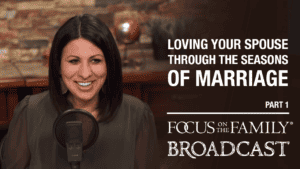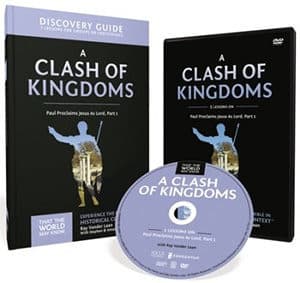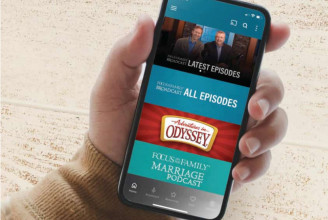Excerpt:
Mr. Ray Vander Laan: The way you shape a culture is by living out the message of shalom in your marriage, in your family, in your business, in your recreation. And as others see it, like the prisoners in the jail, they’re drawn to God.
End of Excerpt
John Fuller: Well, God’s calling for all Christians is that we live in such a way that we transform those around us and the culture. And Ray Vander Laan is gifted at teaching that concept. He’s our guest today on Focus on the Family. Your host is Focus president Jim Daly and I’m John Fuller.
Jim Daly: John, we’re always excited and privileged to spend time with Ray Vander Laan from the That the World May Know Ministries and the host of the DVD series right here from Focus on the Family. Ray, or RVL as most people call him, uses his unique gifts to look at ancient culture and he helps us to apply it to our lives and the culture today, which is what God wants us to do. And on that note, we’ve seen so many opportunities during this health crisis to reach out and serve others. To authentically live out our Christian faith. When times are challenging, people are looking for hope, and this is an opportunity to share our hope in Christ and the things that matter most.
John: And Ray has some very unique, compelling perspectives to share. He’s a religion instructor at Holland Christian Schools in Holland, Michigan. He leads Bible tours to the Middle East. And as you mentioned, Jim, he’s the host of the very popular That the Word May Know video series. Here now is our conversation with Ray Vander Laan.
Jim: Ray, welcome back to Focus.
Ray: Thank you. What an honor.
Jim: I’m excited. Jean and I had a chance to be with you in Israel, and it’s life-changing. I mean, it’s grueling. It’s not a great way to – to sell the program, but for me, I’d say, “Yeah, it’s really hard, a lot of hiking.” But it’s the right thing to do. What are you trying to set, when people view the series, That the World May Know? It’s always with a live group, a group that you – you’re taking. What are you doing, um, physically, emotionally, spiritually in the series with those that go and actually experience it? What are you trying to do with them?
Ray: For me, the part of understanding God’s Word is to recognize that God put it in a certain time and place because that’s where it best fit. It’s true always throughout all history, but it fits into a time and place. So, I love to go there or to do it by video to create the setting and say, “Here’s what God put there. Here’s the culture. Here’s the geography. Here’s the topography. Here’s the history. How does that help us understand the story that God is bringing out at that particular moment?” Reading the Bible in context, I call it. So, I want to get an audience that steps away from their modern world, shuts off their cell phones, gets off the bus, hikes a few miles
Jim: (Laughter) Yes.
Ray: That always takes your mind completely away from what’s so important in our lives, and to get back as close as possible into the world of the Biblical story as it would’ve been then. And then to read God’s Word and to discover there is power in that setting. I liken it to a diamond. You know, you can buy your wife a beautiful diamond, but it’s the setting that makes that diamond stand out…
Jim: Huh.
Ray: …In all its glory. And the setting God picked does exactly that to His story.
Jim: That is a great analogy. In fact, Ray, that’s what I love. You bring, um, things that have happened in the Scripture right to modern-day application. So, when you look at Paul standing before the court in Philippi, what sticks out to you in – in those stories? Uh, what grabs you and says, “I can apply this to my life today?”
Ray: That’s such a good question and – and I – I sit here and it’s – it’s a little bit frustrating in a way, because that’s a question that I’d like about an hour and a half…
(LAUGHTER)
Jim: I know. You’re a teacher. You’re a teacher.
Ray: Uh, because it – it gets right at the heart of the matter. Let’s start this way. When I got to Philippi the first time, through the eyes of someone that God had put in my life, a professor named Costas Calaveras who unfortunately passed away recently. A brilliant, brilliant scholar from Boston College in – in the United States, but Greek. Through his eyes something dawned on me, as I sat there on the hill of Philippi. Right out in front of the hill of Philippi is a plain, a flat open area called the Plain of Drama. And he said, “Well, do you know the Plain of Drama?” And I said, “No, I know the story of Philippi, but I don’t know Drama.” He said, “Then you don’t know Philippi.”
John: Hmm.
Ray: I did not realize how important to world history that spot was, because about a generation and a half before Paul got there, there was a conflict in the Roman world between the Republicans – sorry, I don’t mean that politically, but those who wanted a republic – the Senators…
Jim: Right.
Ray: ….And the Imperialists, those who thought of Rome as an empire. So, the senators, or the republic supporters, assassinated Julius Caesar, who wanted an empire. In response, his adopted son, Octavian and one of his generals, Mark Anthony, decided to teach the conspirators a lesson. So, they raised an army and headed east to teach Cassius and Brutus a lesson for having assassinated Julius Caesar. Cassias and Brutus raised an army in the east and came west and met at the foot of the hill of Philippi on the Plain of Drama. And that battle was going to determine whether Rome was an empire with an emperor who will call himself “god,” or whether Rome would be a republic, a democracy. Well, we all know Octavian and Anthony won and Rome became an imperial power. So, when Paul headed to Philippi, he came on the very same road that those armies came to meet. But Paul was coming with another kingdom, not the kingdom of this world, not Imperial Rome, not a kingdom that called its emperor “god” and the message about the emperor “gospel,” but the kingdom of Jesus. And so, when he arrived at Philippi, there were two very conflicting kingdoms. And what’s interesting to me is that Paul does not address the political situation of his day at all. He doesn’t criticize the emperor. He doesn’t criticize the immorality of the empire. Paul simply proclaims and lives Jesus Christ, Lord and Savior. But the implications of that are a confrontation for the claims of Imperial Rome. So, there’s the setting.
Jim: I love that.
Ray: Oh, and I – I sat there on that hill for – for an hour and a half just with my hair standing on end, thinking, wow. In a sense, God brought those two kingdoms that have been in this world since Satan, uh, came to the Garden of Eden – brought them together right there in the city of Philippi.
Jim: The very same spot.
Ray: Very same spot. Now that led, then, to our unpacking the various lessons that you can find in the story of Philippi in Acts chapter 16. And one of those is the one you asked about, which is Paul being brought to the bema. So, when Paul and Silas arrive at Philippi, there are two kingdoms, in a way. One representing the kingdoms of this world, with a very different set of standards and beliefs and gods, and one the kingdom of our Lord and Savior, Jesus Christ. And the fact that those two kingdoms met in Philippi really moved me deeply, because that’s where we all oughta live. We oughta be living in this world, with all of its kingdoms claiming, um, allegiance of all kinds of things. But we claim the allegiance, that we give our allegiance to Jesus Christ alone. And if we live that consistently, we’re gonna have the same problems Paul had.
Jim: RVL, let me ask you this, just for clarification. Um, why was the Roman Empire – with this lone missionary, Paul – why would they have even taken notice of him? Why did it become a conflict?
Ray: Okay.
Jim: What was he saying that was so offensive…
Ray: Okay. Okay.
Jim: …When he’s preaching peace, love your neighbor, love one another, love your God?
Ray: And really what you’re asking is what’s in Set 15.
Jim: (Laughing).
Ray: Because I’d love to have the whole 2 and half hours. That’s what we exactly unpacked in each lesson, because there are five stories in Acts 16 and 17 that we look at.
But let me draw something out of there and give you an example. After Paul had been in Philippi for a while, a small group of people had become believers. So, now there’s a community of faith, whose living out, an example of what it is like to live for Jesus. In that context, there’s a young girl. And this – this was one of those moments I wept as I unpacked this story the first time. There’s a young girl, a slave girl, and the word there, which – she’s probably 6-, 7-, 8-years-old – who is owned by a group by a consortium of people. And she was brought, apparently, to the pagan temple of Apollo somewhere and they invited the demonic spirit of Apollo to enter her and to take over her. Now, Apollo in their world – think the Oracle at Delphi, which is the main center of Apollo worship. Apollo was believed to grant the right to some to predict the future. So, this little girl would go around giving ecstatic utterances, which either she or her owners would interpret to tell you what was going to happen in the future, and they made a lot of money doing that. She latched onto Paul, and the Bible says, she began to follow him around, yelling day and night, “These men are followers of the Most High God. They’re telling you a way to be saved.” Now that sounds really religious, really Christian almost, but “most high God” to that audience could’ve meant anybody from Jupiter to, if you’re Egyptian, to Amun Ra.
Jim: Sun god, moon god.
Ray: Exactly.
Jim: Right.
Ray: So, she’s just saying they’re claiming a most high god, and “saved” there to a Greek or a Roman wouldn’t have meant saved from your sins and go to heaven. It would mean the god will preserve you from some problem. And the Bible says – and I love the King James translation here. I think it gets at the nuance of the word, that Paul was “grieved in his spirit” at this little kid who was being used by her owners to make, imagine…
Jim: Yeah.
Ray: …Filled with this demonic power. So, he confronted the girl, but he didn’t speak to her. He spoke to the spirit and commanded that the spirit come out of her, which it did. Well, now she couldn’t predict the future anymore. Her owners were furious because in the Roman world, my property is far more important than the life of someone else. So, they aren’t overjoyed that this little girl is back to normal.
John: She’s lost their va – her value to them, right?
Ray: She’s lost her value to them. So, they drag Paul into the Agora, into the heart, the city center of Philippi. And they bring him to the bema, which is the official platform where justice is administered. And they accuse him of teaching things contrary to Roman custom and practice, So, they beat Paul within an inch of his life and Silas, as well. They have them flogged, which is a brutal, brutal treatment, something like was done to Jesus. His may have been more extreme, but they were beaten. Their backs would’ve been bloodied and – and shredded. And then throw into the inner prison and placed in stocks. Now stocks in a Roman world were used – they would put your feet in this implement and then stretch your legs apart until your legs are ready to come out of joint.
Jim: Ah.
Ray: Now, the question that raises for me is, why didn’t Paul use his Roman citizenship?
Jim: Right.
Ray: You can’t do that to a Roman citizen.
John: Hmm.
Ray: Somehow he was dressed as a Jew, he acted like a Jew, he’s accused of being a Jew, but nobody knows he’s a Roman. He could’ve gotten out of that treatment by claiming his Roman citizenship. Now why in this case doesn’t he claim Roman citizenship, when seven years later when he’s brought in front of the Roman authorities in Caesarea, he claims Roman citizenship?
John: He brings it right up. Yeah.
Ray: And even the right to go to the Emperor. Well, let’s go a little farther with the story. He’s put in prison, which was a frightening thing. Prison for Romans was not a penalty. That’s not a punishment. You’re put in prison until we can decide what we’re gonna do to you. So, the likelihood is, when you’re put in prison, what’s gonna happen tomorrow is worse than what happened today.
Jim: Hmm.
Ray: But he still doesn’t declare his Roman citizenship. In fact, the text says, “About midnight, Paul and Silas…” Now imagine. His legs may have been stretched to the point of coming out of joint. His back is shredded. Nobody’s caring for him. He’s sitting in this awkward position in the inner cell, it says, of the prison. He and Silas were praying and singing hymns. Now, I thought about that for a while and then I remember Psalm 119, which says, “Though the wicked may bind me, at midnight I will sing your praises.” And I wonder if Paul thought, you know what? The Bible says, when they do this to us, we’re gonna do what the Bible says. We’re gonna praise God. I – I -I often thought Paul’s laying there in – in serious pain and he says, “Silas, I can’t sleep. Let’s sing a number. You got one?”
(LAUGHTER)
John: Yeah.
Ray: I don’t think so. I think Paul is sitting there saying, “Silas, the Bible says when they bind you, at midnight, sing God’s praises. Let’s sing!” Well, as they were singing, it says the other prisoners were listening. But there was somebody else listening, too, because suddenly (snapping sound) God sent an earthquake, and if you’re familiar with your Bible, you know that at dramatic moments in history, like Jesus’ resurrection or His death, earthquakes hit. And the earthquake leveled the prison, and the prisoners were all free to go, to run. Paul and Silas could’ve run, but they all stayed. There they sat. They were free to go. The jailer came running in, thinking the prisoners had escaped and by Roman law, his life was finished. He was going to be executed. You can’t lose a prisoner. So, he came running in with his sword, ready to kill himself. Now, why would he want to kill himself? Well, maybe to be spared the torture that he could expect from his superiors, when they discovered the jail was empty. Some scholars in (unintelligible), the – the advisor I had was one of them, he said, “I don’t think so.” In Roman law, if you’re accused of a crime and executed for it, your family is sold into slavery, and you lose everything. But if you commit suicide, that’s considered honorable. Your family will survive, and they will inherit your property. I think it’s more likely that man, not a believer, had morality enough in his heart to say, “I’m gonna protect my family with the last thing I do.”
Jim: Huh.
John: Hmm.
Ray: And Paul said, “Don’t do it. We’re all here.” And the impact of this man realizing, I had him beaten within an inch of his life. I put him in the stocks. I didn’t treat his wounds. But he still protected my life by not running away. He risked his life for me!” Was so profound that he lays himself at Paul and Silas’s feet and says, “What must I do to be saved? “Now, I don’t think “saved” there means what Christians mean, because he wouldn’t have known anything about sin and – and any of that. I think “saved” means, “What must I do to be delivered from this world of mine? If I – my commander wouldn’t have done this for me. Jupiter wouldn’t have done this for me. What you did for me, even though I don’t deserve, what must I do?” And then it says, “And Paul went to his house and taught him the Word of God.” So, now (laughter) he had to explain what being saved means. My point, though, back to your question, all of that to say, notice what it was that impacted the jailer. The earthquake didn’t convert him. It was the realization that Paul would risk his life for someone who didn’t deserve it.
John: Yeah.
Jim: Right.
Ray: And I even wonder, and this is just RVL’s question, so if – I’m not suggesting it’s anything profound. I wondered why the other prisoners stayed.
Jim: That had to be the impact.
Ray: Were they so effected by Paul and Silas singing in the middle of the night to their God that they wanted to become part of that?
Jim: It’s reasonable.
Ray: I don’t know. Anyway, to cut to the chase, the next morning the officials from the town sent word to the jail, and Paul is still there and said, “Let him go.” I don’t know if they thought the earthquake was a sign from their gods, or what. And Paul says, “What? I’m a Roman citizen. You beat me without a trial and now you’re just gonna say, ‘go away?’ I want an official apology and an escort.” And now he declares his citizenship, when it isn’t gonna do him any good. (laughter) It’s not gonna prevent his beating. It’s not gonna prevent him from being in prison.
Jim: Yeah, he’d be free.
Ray: He’d be free.
Jim: Now why?
Ray: That’s a good question. I think – I think and this is a opinion I found from a number of different thinkers, all the way back to the early church, Paul wanted the validation of his message to be not, “I’m a Roman citizen in this Roman city. I don’t want you to listen to me because I’m Roman.”
Jim: Right.
Ray: “I want you to listen to me because of the validity of the message.”
Jim: Right.
John: Hmm.
Ray: “But now that you’ve heard the message, and it’s been validated by God Himself, now I’m gonna declare my citizenship, because in this town is a little community of believers; a slave girl; the jailer; his family; Lydia, the dealer in purple and her family. And that’s a risky business…
Jim: Hmm.
Ray: …To be believers in a Roman city like this. And I think Paul is covering for them. I think Paul is saying, “f anything happens to that little community, I’m gonna go to the nearest governor, and I’m gonna tell him what you guys did to me as a Roman citizen.” And I think Paul is providing some protection for the believers. So, in this case, he chooses not to use the very citizenship that in another case is what he does in order to get to see the Emperor himself.
Jim: RVL, the – man, I mean, this is flying by, and I love this kind of history and background, and the question we need to end with now, today, and we’re gonna come back next time, but the question right now is, how does this apply to me? How do I find the power in my relationship with God to not put myself first, to not be focused on my comfort….
Ray: Mm hmm.
Jim: …My security, but to say in essence, “Lord, use me”? Paul praying and singing in prison, how many of us believers today would be able in our Christian maturity to be able to do that, rather than complain, “This food’s horrible,”? You know, whatever it might be. And I – I’m saying that application, so that we can get that ah-ha view….
Ray: Mm hmm.
Jim: …Into everything you just shared. How does it impact me?
Ray: See, It seems to me that it’s easier for us as followers of Jesus to want to speak the message of shalom, the message of salvation in Jesus. It’s much harder to be the message. And it seems to me, what Paul is demonstrating there is, he didn’t tell the jailer to believe in Jesus. He went into the jail and lived it in a specific situation so that as others saw what it looks like, when you have shalom in your soul, they wanted in. You know, it’s the Ruth story. Ruth is a Moabite. She is, according to the book of Deuteronomy, an outsider for 10 generations. But somehow, she meets her mother-in-law, Naomi, and her – her father-in-law, Elimelech, and they tell her about the God of Israel. But I can tell you if they didn’t also live consistently God’s shalom, she would not have been drawn to the God of Israel. If they would’ve been cold and uncaring and ungodly, she wouldn’t have been drawn to Naomi’s God. But she was so taken by those two people and their faith, somehow, that she said, “I want your God to be my God. I want your people to be my people.” And that’s always been God’s way. Yes, we tell about Jesus, but we tell about Jesus more by who we are and how we live than we do by what we say. And I – I – this was the struggle I had in my soul as – as we walked through Philippi for two weeks and – and – and put this all together. The – the struggle in my soul was, it’s so easy in the culture I live in, to think the way to bring about Christian influence is by power, by politics, by economics. Now all of those things belong to God, and we oughta be working as hard as we can for righteousness in every one of them. The way you shape a culture is by living out the message of shalom in your marriage, in your family, in your business, in your recreation. And as others see it, like the prisoners in the jail, they’re drawn to God.
Jim: And the difficulty there, RVL, is how to – you have to invite the Holy Spirit to inform you in that way.
Ray: Mm hmm.
Jim: And it is this internal battle between our flesh and the Spirit. And what do we do to put our flesh in a – in a healthier place? Because it’s – if someone cuts you off on the road, yeah, I’m talking to the listener right now. There is happened.
(LAUGHTER)
Jim: That fleshly response comes out. How do we bridle ourselves like Paul did and respond so a person will say, “Wow! What do you have that I don’t have? ‘Cause I would’ve reacted in an entirely different way than you did.”
Ray: Exactly. Yeah. Yeah.
Jim: That’s the point of the jail story.
Ray: You know, and that’s a great question, and there are many things that come into my mind at that moment. I teach a course at Holland Christian called Discipleship. And I find that it’s much easier for us, starting with me, to believe that Jesus is my Savior and to know my eternal future is cared for – is taken care of by His grace, than it is to become a disciple. A disciple is someone who imitates his or her rabbi. And it’s much tougher to go into life and say, “Okay, I believe in Jesus, but now I’m gonna have Jesus’ faith, as well. I’m going to live the way Jesus did.” But it strikes me, what helps students is, as they begin to realize that the way in which God wants us to influence our world is by being the message. God said to Moses, “Go to Pharaoh. You will be as God to Pharaoh.” So, when Pharaoh saw Moses, he got a glimpse of what God was like. That’s what God wants from each one of us. So, I find, when I’m on the road, and I can tell this guy’s gonna cut me off, if I can just get my mind to say, “RVL, you’re here to be the message. You’re here to catch a glimpse of what God is like. You can’t say that. You can’t do that. You can’t…” It doesn’t always work, to be honest, but it helps.
Jim: Right and that’s the – I think that’s the point. We so often want to respond in a worldly way. It’s true.
Ray: Mm hmm.
Jim: And even Christians, we’re not perfect, and we’re gonna have slips, probably depending upon the – the level of the grievance, right? But how much better to respond as Paul and Silas illustrate for us, to respond with God’s character…
Ray: Right.
Jim: …God’s love, but you have got to bridle your human appetite for revenge, for striking back, and that can be really hard. RVL, man, the time has flown by. I love the storytelling. I get excited about this, John, and I think you can see that. It has an impact on you, if you’re sincere in hearing the message and hearing the teaching and applying that. And this has been true here at Focus on the Family, RVL, when we did, um, foster care and these other things that we do. Option Ultrasound to help save the life of a baby…
Ray: Mm. Mm.
Jim: …To save a marriage. Many people that have opposed Focus are seeing these things that we’re doing and they’re saying, “I don’t agree with you, but I respect that.” That’s the cracking of the door.
Ray: Mm hmm. Amen.
Jim: That’s the heart opening up to the message.
Ray: Catch a glimpse of the heart of God.
Jim: And we don’t have to fight. We don’t have to, as Paul did, he didn’t go right at Rome. Say, “Change the Emperor. The Emperor’s horrible.”
Ray: (Laughter).
Jim: Um, how many people with whatever administration in this country you want to support, how many people complain about that? Let’s do what we can do at the local level that will impact the national level by being Jesus in the culture.
Ray: Amen.
Jim: And that’s the message and I love it.
John: And that’s the kind of message you’re going to find in “A Clash of Kingdoms” set 15 from That the World May Know. We’ve got that at focusonthefamily.com/broadcast. Or when you call 800, the letter A and the word FAMILY. 800-232-6459.
Jim: And John, Ray has reminded us today about being the message of Christ in the culture and here are great opportunities for Christians to do that in this time of great uncertainty. So, reach out to your neighbors, to your community, – even if that means online – and be an encouragement to others. And Focus on the Family stands ready to help you with counseling and practical, Godly advice. We are offering hope to people all across the country. So, one way you can reach out to others is by helping us financially. Please, if you can, send a gift to Focus on the Family of any amount and when you do, we’ll send you a copy of that DVD, That the World May Know, along with a study guide, as our way of saying thanks.
John: And right now, some generous friends of Focus on the Family have offered to help out by matching any gift that you send in today. So, your donation is going to go twice as far and have twice the impact when you call today and help Focus on the Family to reach out to people in need. Donate a gift of any amount when you call 800, the letter A and the word FAMILY. On behalf of Jim Daly and the entire team, thanks for listening today and join us again next time. We’ll have more from Ray Vander Laan and once again help you and your family thrive in Christ.





















